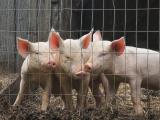Jul 10, 2009
US warns that China may quarantine children traveling alone
The US State Department yesterday said parents planning to send unaccompanied children to China should consider postponing such trips until China changes its quarantine policies or the H1N1 flu pandemic subsides. The agency said some unaccompanied minors, including some under 10 years old, have been quarantined on arrival in China. It is nearly impossible to predict which travelers might be quarantined, and the US continues to receive reports of poor quarantine conditions, officials said.
H1N1 case count in US tops 37,000
The US tally of pandemic H1N1 flu cases has risen to 37,246, with 211 deaths, the CDC reported today. The numbers are up by 3,344 cases and 41 deaths since the last CDC report on Jul 2. Wisconsin led the list with 6,031 cases and 4 deaths, followed by Texas (4,463 and 21), Illinois (3,259 and 14), New York (2,582 and 52), and California (2,461 and 31).
[Current CDC numbers]
US flu activity down, but still above normal
US influenza activity decreased last week but stayed above normal for this time of year, the CDC said in its weekly flu surveillance report today. More than 97% of the influenza A viruses that were subtyped were the novel H1N1. Nine states still reported widespread flu activity, while 10 states and Puerto Rico reported regional activity. Five novel H1N1–related pediatric deaths were reported. The proportion of medical outpatient visits due to flu-like illness was below the national baseline.
[CDC flu report for Jun 28 to Jul 4]
Pigs vulnerable to novel H1N1 flu
Piglets experimentally infected with the novel H1N1 flu develop symptoms and measurable immune responses, excrete virus, and can infect other pigs (but not chickens), researchers from Germany's Friedrich Loeffler Institute report today in the Journal of General Virology. The findings echo USDA Agricultural Research Service data. The authors voice concern that the virus will become endemic in farmed pigs and ask whether human access to them should be controlled.
[J Gen Virol full text]
HHS details preparedness grants for states
The Department of Health and Human Services (HHS) today announced state-by-state details of the $350 million it will grant states and territories to prepare for H1N1 pandemic and seasonal flu. State public health departments will receive $260 million, and hospitals $90 million. States receiving the most funds were (in millions): California ($22.7), Texas ($20.1), Florida ($15.5), Pennsylvania ($10.6), Ohio ($9.8), New York ($9.5), Michigan ($8.6), Illinois ($8.6), and Georgia ($8.0).
[Jul 10 HHS press release]




















